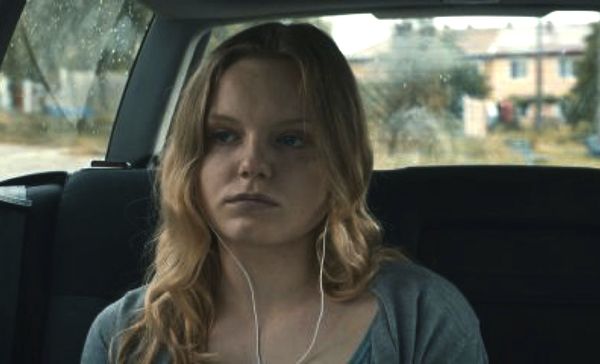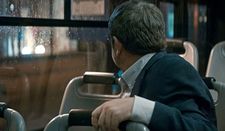 |
| Cristian Mungiu on Cannes Artistic Director Thierry Frémaux: "The only thing he has doubts about is that it's too clear who throws the stone." |
Scenes of delicate opacity haunt Graduation (Bacalaureat). At a police lineup, one of the suspects of an assault is hidden from our view by the back of the head of Eliza, the victim (Maria-Victoria Dragus). From a bus, her father Romeo (Adrian Titieni) sees someone and follows that specter into the night and crosses over to a neighborhood soaked in sounds of invisible people and dogs. In a scene of real horror, Eliza's boyfriend Marius (Rares Andrici) shows himself willing to go a step further.
 |
| Maria-Victoria Dragus as Romeo's daughter Eliza |
Cristian Mungiu is a Cannes Film Festival favourite - Palme d'Or win for 4 Months, 3 Weeks And 2 Days; Best Screenplay for Beyond The Hills and Best Actress honors to Cristina Flutur and Cosmina Stratan, and in 2016 shared Best Director with Olivier Assayas. Cristian will head this year's Cinéfondation and Short Film Jury.
In Graduation we see people discussing questions of morality, people who are aware that cheating on exams or accepting bribes is wrong and do it anyway. One hand washes another while interconnectedness facilitates and endangers the rampant, age-old corruption.
Anne-Katrin Titze: Something I noticed in Graduation was how many links there are to idioms in English. Loosing your marbles - or keeping your marbles. A mountain and a molehill - with the digging. Apples and oranges. Throwing the first stone.
Cristian Mungiu: Throwing the stone translates into several languages, I think, whereas some others don't. A question people often ask is "So who threw the stone? Why isn't this very clear in the film?" If you think about it, it's very clear. It's as clear as it should be for me.
 |
| Romeo (Adrian Titieni): "While you are in Kensington Gardens with squirrels chasing you, you'll forget and doubt that this was real." |
There is a small, funny incident about this. I was mixing the film in Paris in February [2016]. By the end of the mix, I showed the film to my French distributor, who is a very fine person. He is a cinephile and knows a lot about cinema. He knew the screenplay, he liked the film a lot but he told me that he had this observation that for him it's not clear enough in the film who throws the stone.
He told me, "this is important, because you don't understand, we don't live in the Sixties any longer. People need to have the answer!" I was telling him why I think the answer is there. I think two or three weeks later, Thierry Frémaux, who is the Cannes film delegate watched the film. They selected the film for Cannes and they liked the film a lot. He [Frémaux] sent me this observation through my sales agent that the only thing he has doubts about is that it's too clear who throws the stone. So I said, good, okay, you should be talking…
AKT: To each other!
CM: Because it means that it's quite balanced. It means that it's fine. But for this thing with the stone, there is a connotation which I like. You know there is this thing in the Bible?
 |
| Romeo with his mistress Sandra (Malina Manovici) |
AKT: Right.
CM: That he who can throw the first stone, is the one who is sinless, whatever.
AKT: Without sin, yes.
CM: I thought that's enough of an explanation about this.
AKT: The fantasy world of England that the father constructs - I also connected that to naming the daughter Eliza, as in My Fair Lady. At one point he says "While you are in Kensington Gardens with squirrels chasing you, you'll forget and doubt that this was real."
It's so clear that this is his imagined England he is wishing for the daughter to inhabit. I like how this connects to him also saying that she can't survive in Romania. We want to send her to a paradise that doesn't exist?
CM: Primarily this comes from people living during the Communist period when they were not having enough information about the western world. So they were fantasizing a lot, imagining, I don't know, this Eden.
 |
| Cristian Mungiu: "If you don't have information about some distant place, you will place a lot of your thoughts on it." |
We needed a long while after the fall of communism to just understand that, okay, things are better organised and there's wealth and people are more civilised but there are problems everywhere. This is what people do. If you don't have information about some distant place, you will place a lot of your thoughts on it.
It's not necessarily about England. England is just a module. It could have been the United States or France or whatever. When I make films, I try to do them with what I consider to be the most possible, probable, most currently met module. We have this idea that there's not only a prosperity but there's a dignity associated with Britain. Because they have this grass which they planted five hundred years ago and it's still there.
AKT: That's where the squirrel plays.
CM: That's a cultural thing! Honestly, the first time when I travelled abroad after the fall of communism was 1991. It was the first time we were allowed to travel in the western world. I flew to London, I spent some weeks in Edinburgh with a scholarship and the grass and the squirrels struck us completely. Because it's normal for you here - it's crowded with squirrels in Central Park - but for us and for the children there this is an event.
 |
| Sandra's son (David Hodorog) |
Your children are happy when they see an animal, so the idea that you have access to that; like on a daily basis it's happening. You know, it's this desire that all parents have to have a happy life for their children. Basically, the film is a lot about this.
AKT: You're balancing it with the dogs, the wild dogs that are there.
CM: Yeah. This is also the result - people might not know, why we have so many wild dogs - it's also the result of the communist period. There was a moment when they decided … You know, the industry grew, even if this was not on an economical basis, but they built a lot of industry.
They needed a lot of workers, they brought a lot of peasants from smaller villages to towns. And they became townsmen, if you want, even if they were still peasants. They left behind everything, including their animals back home. And there was this uncontrolled spreading of animals.
AKT: You can also see the wild dogs in Maren Ade's Toni Erdmann.
CM: Yes, that's shot in Bucharest. It's true that I encourage having dogs in the shot always. They are always around. I have this relationship with animals. I encourage them to be there.
_225.jpg) |
| Cristian Mungiu: "There is this dog who watches the window…" |
AKT: You encourage them to be there?
CM: Yes, of course. I have someone on the set who takes care of this, so that there are animals in the shot as much as I can. There's a dog in the film who is really a very very good actor, I have to say. I have two. But one that I like a lot. And you can't do this with a trained animal.
There is this dog who watches the window, like this, very calm before someone smashes the window and then he is like "owooooo" and he runs right in the middle of the shot!
AKT: The perfect dog actor.
CM: You can't do this twice, you know!
Read what Cristian Mungiu had to say about honesty, guilt and Graduation.
Graduation comes out in the UK on March 31 and in the US on April 7.





















